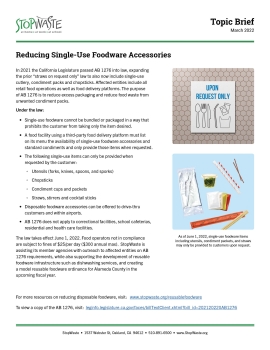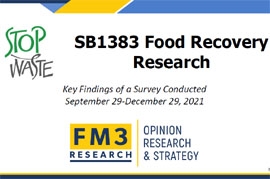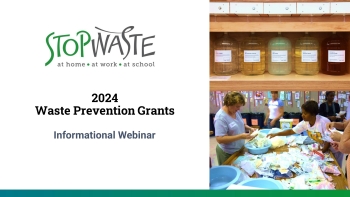Resource Library
 Topic Briefs
Topic BriefsA new California State law, SB 1383, aims to keep food and other compostable materials out of landfills to reduce methane emissions that contribute to climate change. An important requirement of the law is that food generating businesses must recover surplus edible food that would otherwise be disposed of and donate it to feed people.
Read MoreThis recordkeeping document was adapted from CalRecycle’s Model Recordkeeping Tool for food recovery organizations and services, to ensure compliance with the monthly recordkeeping requirements. The use of this specific tool is optional. The tool can be customized by food recovery organizations and services to assist with SB 1383, ORRO or other local ordinance compliance.
Read More
Use one of these forms to maintain monthly records of types of food donated, frequency of donations, and total pounds of food donated to Food Recovery Organizations or Food Recovery Services (FRO/FRS), and/or distributed directly to staff or other individuals.
Read More Topic Briefs
Topic BriefsIn 2021 the California Legislature passed AB 1276 into law, expanding the prior “straws on request only” law to also now include single-use cutlery, condiment packs and chopsticks. Affected entities include all retail food operations as well as food delivery platforms. The purpose of AB 1276 is to reduce excess packaging and reduce food waste from unwanted condiment packs.
Read More
Download StopWaste 2021 SB 1383 Edible Food Recovery Capacity Survey to learn more about Alameda County food recovery organizations and services capacity to recover donated food from Tier One and Tier Two donors.
To learn more about SB 1383 and ORRO, click here.
Read More Topic Briefs
Topic BriefsA new California State law, SB 1383, aims to keep food and plant materials out of landfills to reduce emissions that contribute to climate change (food scraps emit more methane than any other material in the landfill). Under the law residents must properly sort recyclable and compostable materials into the appropriate containers.
Read More Topic Briefs
Topic BriefsIn 2017, StopWaste began working with the Alameda County Resource Conservation District and later additional partners (The Natural Resource Conservation Service and UC Merced) to add to the body of knowledge on how carbon farming can fight climate change through the application of compost on range lands.
Read More
Tune in to hear StopWaste's grant team managers go over the six different categories, the types of applicants and projects eligible for funding, frequently asked questions, and more.
Read More
StopWaste provides grants of up to $10,000 for nonprofits to acquire food storage equipment, aimed at increasing safe recovery and distribution of surplus food. This guide includes details on eligible equipment, PG&E incentives for qualified products, selection criteria for equipment, and the rebate process.
Read More